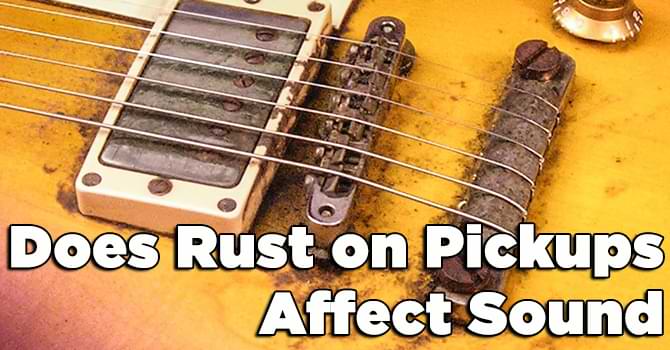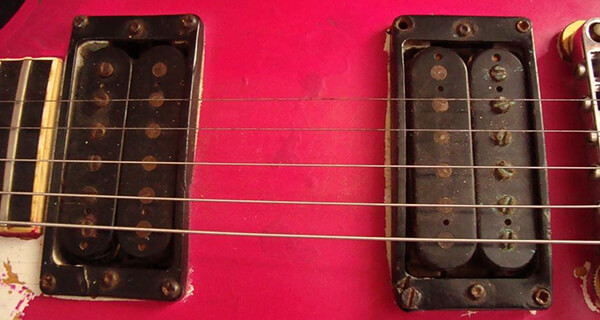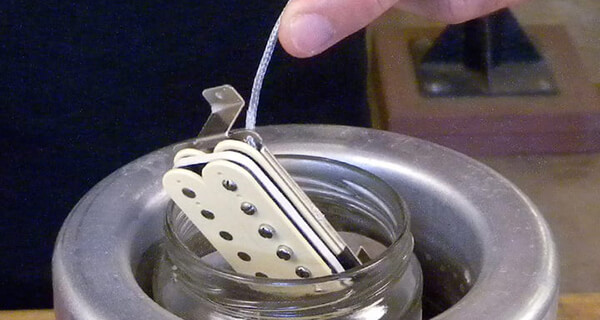Does Rust on Pickups Affect Sound [Reason & Way to Prevention]
An often overlooked factor that can significantly impact the sound quality of pickups is rust. Rust on pickups can lead to various issues, affecting not only the aesthetics but also the overall sonic performance of your instrument.

In this comprehensive guide, we will delve into the reasons behind how rust on pickups affects sound, the implications it can have, and effective solutions to address does rust on pickups affect sound.
# Table of Contents =>
- 1 Does Rust on Pickups Affect Sound: Reason & Prevention –
- 2 How to Prevention – Rust Issue:
- 2.1 Rust affect on guitar pickups:
- 2.2 v) Long-Term Damage:
- 2.3 Proper Maintenance & Care:
- 2.4 FAQs –
- 2.4.1 Question 1: Does rust on pickups really affect the sound of a guitar?
- 2.4.2 Question 2: How does rust impact the magnetic fields of pickups?
- 2.4.3 Question 3: What are the signs that rust is affecting my guitar pickups?
- 2.4.4 Question 4: Can rust on pickups lead to sustain problems?
- 2.4.5 Question 5: How can I prevent rust from forming on my pickups?
- 2.4.6 Question 6: Can I restore the sound quality of rusty pickups?
- 2.4.7 Question 7: Should I replace rusty pickups or clean them?
- 2.4.8 Question 8: How often should I check my pickups for rust?
What Causes Rust on Pickups?
Rust is a natural process that occurs when metal comes into contact with moisture & oxygen. Pickups, which consist of metal components, are vulnerable to rust when exposed to humid environments, sweat from hands, or even poor storage conditions. Metal parts such as pole pieces, screws & covers are particularly prone to rust, as they are often in direct contact with air and moisture.
Symptom of Rusty Guitar Pickup:
Rusty guitar pickups can exhibit various symptoms that affect the overall sound and performance of your instrument. Here are some common symptoms you might notice if your guitar pickups are rusty:
a) Dull or Muted Tone:
One of the most noticeable symptoms of rusty pickups is a dull or muted tone. The rust can interfere with the magnetic fields around the pickups, leading to a loss of high frequencies and brightness in your guitar’s sound.
b) Lack of Clarity and Definition:
Rust on pickups can cause irregularities in the magnetic field, resulting in a lack of clarity and definition in your playing. This might make it difficult to distinguish individual notes and chords, leading to a muddier sound overall.
c) Inconsistent Volume Across Strings:

Rust can lead to variations in the pickup’s response across different strings. You might notice that certain strings sound louder or quieter than others, which can make it challenging to achieve a balanced and even sound.
d) Increased Noise and Interference:

Rusty pickups are more susceptible to electromagnetic interference. This can result in increased background noise, buzzing, or humming when you’re playing, especially if there are electronic devices nearby.
e) Altered Tonality:
Rust can alter the resonant frequency of the pickup, causing changes in the tonal characteristics of your guitar. Your guitar might sound different than it did before the rust developed, with a potential loss of the distinctive qualities you love.
f) Sustain Issues:
Rust can disrupt the vibrations of the strings captured by the pickups, potentially leading to sustain issues. Your notes might not ring out as clearly or as long as they used to.
g) Unpredictable Performance:
Rust can introduce inconsistencies in your guitar’s performance. Your instrument might respond differently to your playing than it did previously, making it harder to achieve the desired sound.
h) Visual Signs:

In addition to the sonic symptoms, you might also notice visible signs of rust on the pickup covers, pole pieces, screws, or other metal components of your pickups.
Does Rust on Pickups Affect Sound: Reason & Prevention –
The Impact of Rust on Sound Quality:

Rust on pickups can lead to a range of sonic issues, primarily due to the alteration of the pickup’s magnetic properties. Pickups work by utilizing magnetic fields to capture the vibrations of the guitar strings and convert them into electrical signals. Rust can disrupt these magnetic fields, leading to several sound-related problems:
Loss of Clarity and Definition:
Rust can cause irregularities in the magnetic field, leading to a loss of clarity and definition in the sound produced by the pickups. This can result in a muddy or unclear tone, making it difficult to distinguish between individual notes and chords.
Altered Tone and Frequency Response:
Rust can impact the resonant frequency of the pickup, altering the overall tone. A rusted pickup might produce a duller, less vibrant sound compared to its original state. High frequencies may be attenuated, leading to a lack of sparkle and brightness in the tone.
Increased Noise and Interference:
Rust can introduce unwanted noise and interference into the signal chain. The disrupted magnetic field can pick up electromagnetic interference from surrounding electronic devices, leading to humming, buzzing, or even radio frequency interference.
How to Prevention – Rust Issue:
The best approach to dealing with rust on pickups is prevention. Store your guitar in a controlled environment with proper humidity levels, and wipe down the pickups and metal components regularly to remove moisture and sweat. Using a case or gig bag with moisture-absorbing materials can also help maintain optimal conditions for your instrument.
a) Cleaning and Maintenance –
Regular cleaning and maintenance can significantly prolong the life of your pickups and prevent rust. Here’s an effective cleaning process:
b) Gather Materials –
You’ll need a soft cloth, mild cleaning solution (water and a small amount of dish soap), a toothbrush, and a small amount of lubricant (such as mineral oil).
c) Unstring and Shield the Guitar –
Remove the strings and cover the guitar’s body and fretboard with a soft cloth to prevent any cleaning solution from reaching these areas.
d) Clean the Pickups –

Dampen the toothbrush in the cleaning solution and gently scrub the rusted areas of the pickups. Be careful not to scrub too vigorously, as you don’t want to damage the delicate winding of the coils.
e) Dry and Lubricate –

Use a dry cloth to wipe off any excess moisture, then apply a small amount of lubricant to the metal components to prevent future rusting.
f) Professional Restoration –
If your pickups are severely rusted or the sound quality is significantly compromised, seeking the assistance of a professional guitar technician is advisable. They can assess the extent of the rust damage and recommend appropriate restoration techniques, which may include pickup replacement or rewinding.
g) Pickup Covers and Wax Potting –
Installing pickup covers can offer an extra layer of protection against rust. These covers shield the metal components from direct exposure to moisture and air. Extra, wax potting, a process where pickups are potted in wax to secure the internal components, can help minimize the effects of rust and reduce unwanted noise.
Rust affect on guitar pickups:
Yes, rust can indeed affect guitar pickups. Guitar pickups are made up of various metal components. That is including pole pieces, screws & sometimes even the coil windings themselves. Since rust is a chemical reaction that occurs when metal is exposed to moisture & oxygen. It can have several negative effects on the performance and sound quality of guitar pickups.
Here’s how rust can impact guitar pickups:
I) Altered Magnetic Fields:

Guitar pickups work by utilizing magnetic fields to capture the vibrations of the guitar strings. Rust can disrupt these magnetic fields, leading to irregularities in the pickup’s response to the strings. This can result in a loss of clarity, definition, and even altered tonal characteristics.
II) Sound Quality Degradation:
Rust can cause a loss of high frequencies and overall brightness in the sound produced by the pickups. The rusted metal components might not resonate as efficiently, leading to a duller and less vibrant tone. This can impact the overall character of the guitar’s sound.
III) Increased Noise and Interference:
Rust on pickups can make them more susceptible to electromagnetic interference. The disrupted magnetic field can pick up unwanted noise from electronic devices or radio frequencies, resulting in buzzing, humming, or static in the signal chain.
IV) Unpredictable Performance:
As rust develops, it can create inconsistencies in the pickup’s response across the strings. This can lead to variations in volume and tone between different strings. That is making it challenging to achieve balanced and consistent sound output.
v) Long-Term Damage:
Rust can cause structural damage to the metal parts if it is not treated. This can result in a decrease in the pickup’s overall lifespan & may necessitate more extensive repairs or even replacement.
Proper Maintenance & Care:
To mitigate the effects of rust on guitar pickups, it’s important to practice proper maintenance and care:
a) Regular Cleaning:

Wiping down your pickups and metal components after playing can help prevent moisture buildup, which can lead to rust. Use a soft cloth to remove any sweat or moisture from the pickups.
b) Controlled Environment:

Store your guitar in a controlled environment with appropriate humidity levels. High humidity can accelerate rust formation, so using a guitar case with humidity control or moisture-absorbing materials can help maintain optimal conditions.
c) Wax Potting:

Some pickups are “potted” in wax during the manufacturing process. Wax potting involves immersing the pickup components in wax to seal them and provide protection against moisture and interference. This can help prevent rust and improve overall pickup performance.
d) Professional Maintenance:
If you notice rust developing on your pickups or experience a decline in sound quality, consider seeking the help of a professional guitar technician. They can assess the extent of the rust and recommend appropriate solutions, which might include cleaning, re-potting, or pickup replacement.
In summary, rust can have a significant impact on the sound quality and performance of guitar pickups. Regular maintenance, proper storage, and timely intervention can help prevent and address rust-related issues, ensuring that your guitar continues to produce the best possible sound. Now, clear about the topic of the question “Does Rust on Pickups Affect Sound”.
FAQs –
Question 1: Does rust on pickups really affect the sound of a guitar?
Answer: Yes, rust on pickups can indeed affect the sound of a guitar. Rust disrupts the magnetic fields that pickups rely on to capture string vibrations, leading to changes in tone, clarity, and overall sound quality.
Question 2: How does rust impact the magnetic fields of pickups?
Answer: Rust interferes with the magnetic interaction between the pickups and the guitar strings. This disruption can cause a loss of high frequencies, altered tonal characteristics, and a decrease in sound clarity.
Question 3: What are the signs that rust is affecting my guitar pickups?
Answer: Signs of rust affecting pickups include a dull or muted tone, lack of clarity, inconsistent volume across strings, increased noise and interference, altered tonality, sustain issues, and changes in the guitar’s response to playing.
Question 4: Can rust on pickups lead to sustain problems?
Answer: Yes, rust on pickups can potentially lead to sustain issues. The disrupted magnetic fields can impact the vibrations of the strings, resulting in notes that do not ring out as clearly or for as long as they should.
Question 5: How can I prevent rust from forming on my pickups?
Answer: To prevent rust, store your guitar in a controlled environment with appropriate humidity levels. Wipe down your pickups and metal components after playing, and consider using pickup covers or wax potting to provide an extra layer of protection.
Question 6: Can I restore the sound quality of rusty pickups?
Answer: Depending on the extent of rust and damage, restoring the sound quality of rusty pickups is possible. Proper cleaning, maintenance, and potential repairs can help improve the performance of pickups affected by rust.
Question 7: Should I replace rusty pickups or clean them?
Answer: Whether to replace or clean rusty pickups depends on factors like the severity of rust and the pickup’s overall condition. Cleaning can help in less severe cases, while extensive rust or significant sound quality issues might warrant replacement.
Question 8: How often should I check my pickups for rust?
Answer: Regularly inspect your pickups for any signs of rust, especially if you live in a humid climate or play frequently. Routine checks, along with proper maintenance, can help prevent rust-related problems and ensure optimal sound quality.
Remember that rust on pickups can have a noticeable impact on your guitar’s sound and performance. Taking proactive steps to prevent rust and addressing the issue promptly can help you maintain the desired tone and quality from your instrument.
Last Updated on September 14, 2023 by Perry Garner


